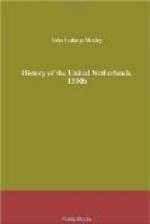On the other hand, the Holy League, the sacred Confederacy, was catholic or nothing. Already it was more papist than the pope, and loudly denounced Sixtus V. as a Huguenot because he was thought to entertain a weak admiration both for Henry the heretic and for the Jezebel of England.
But the holy confederacy was bent on destroying the national government of France, and dismembering the national domain. To do this the pretext of trampling out heresy and indefinitely extending the power of Rome, was most influential with the multitude, and entitled the leaders to enjoy immense power for the time being, while maturing their schemes for acquiring permanent possession of large fragments of the national territory. Mayenne, Nemours, Aumale, Mercoeur longed to convert temporary governments into independent principalities. The Duke of Lorraine looked with longing eyes on Verdun, Sedan, and, the other fair cities within the territories contiguous—to his own domains. The reckless house of Savoy; with whom freebooting and landrobbery seemed geographical, and hereditary necessities, was busy on the southern borders, while it seemed easy enough for Philip, II., in right of his daughter, to secure at least the duchy of Brittany before entering on the sovereignty of the whole kingdom.
To the eyes of the world at large: France might well seem in a condition of hopeless disintegration; the restoration of its unity and former position among the nations, under the government of a single chief, a weak and wicked dream. Furious and incessant were the anathemas hurled on the head of the Bearnese for his persistence in drowning the land in blood in the hope of recovering a national capital which never could be his, and of wresting from the control of the confederacy that power. which, whether usurped or rightful, was considered, at least by the peaceably inclined, to have become a solid fact.
The poor puppet locked in the tower of Fontenay, and entitled Charles X.; deceived and scared no one. Such money as there was might be coined, in its name, but Madam League reigned supreme in Paris. The confederates, inspired by the eloquence of a cardinal legate, and supplied with funds by the faithful, were ready to dare a thousand deaths rather than submit to the rule of a tyrant and heretic.
What was an authority derived from the laws of the land and the history of the race compared with the dogmas of Rome and the trained veterans of Spain? It remained to be seen whether nationality or bigotry would triumph. But in the early days of 1590 the prospects of nationality were not encouraging.
Francois de Luxembourg, due de Pincey, was in Rome at that moment, deputed by such catholic nobles of France as were friendly to Henry of Navarre. Sixtus might perhaps be influenced as to the degree of respect to be accorded to the envoy’s representations by the events of the campaign about to open. Meantime the legate Gaetano, young, rich, eloquent, unscrupulous, distinguished alike for the splendour of his house and the brilliancy of his intellect, had arrived in Paris.




